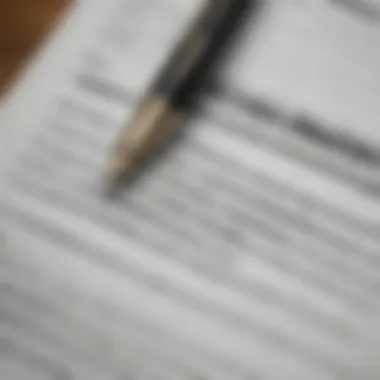Navigating Mobile Home Park Insurance in Florida


Intro
Mobile home park insurance is an essential product for both park owners and residents in Florida. It serves to protect against various risks, including property damage, liability claims, and natural disasters, which are particularly relevant in a state known for its unique environmental challenges. As mobile home parks become more prevalent in Florida's housing landscape, understanding the intricacies of this insurance is crucial.
In Florida, mobile home parks must navigate a specific set of legal requirements while addressing the wide range of risks associated with ownership and residency. This guide aims to provide clarity and actionable insights into mobile home park insurance, ensuring that stakeholders can make informed decisions. As the article unfolds, we will delve into different coverage types, key considerations, and strategic management practices vital for safeguarding investments.
Overview of Financial Product
Definition of product
Mobile home park insurance is a specialized insurance policy designed to protect owners and residents of mobile home communities. This insurance typically includes coverage for physical assets such as the mobile homes themselves, common areas, and amenities.
Importance of the product for consumers
The significance of mobile home park insurance cannot be overstated. It not only protects against common risks such as fire, theft, and natural disasters, but it also provides liability coverage in case of accidents occurring on the park's premises. For residents, having this coverage can lead to peace of mind and financial security, knowing that their home and belongings are protected.
Types of available options
There are several distinct types of coverage available under mobile home park insurance:
- Property insurance: Covers physical damage to mobile homes and common areas.
- Liability insurance: Protects park owners against claims made by residents or visitors.
- Loss of rental income coverage: Offers protection against loss of income due to events that disrupt the park's operations.
- Flood insurance: Particularly relevant in Florida due to the high risk of flooding.
In-Depth Comparison
Feature analysis
When evaluating mobile home park insurance options, it is crucial to analyze the features each policy offers. This includes looking at coverage limits, exclusions, and deductibles, all of which can significantly impact the overall protection provided.
Benefits vs.
drawbacks
Each type of coverage comes with both benefits and drawbacks. While comprehensive coverage may provide extensive protection, it can also lead to higher premiums. Conversely, opting for minimal coverage may save money in the short term but could expose the owner to greater risks.
Cost considerations
Cost is a significant factor for any insurance product. Understanding the range of premiums based on the park’s location, size, and risk profile will aid in budgeting appropriately. Engaging with insurers to obtain customized quotes can help park owners find the most economical options.
User ratings and reviews
Researching user ratings and reviews can provide insights into the reliability and customer service of different insurance providers. Dedicated platforms or forums may prove useful for gathering genuine feedback from existing policyholders.
Best Practices for Choosing the Right Product
Key factors to consider
When selecting mobile home park insurance, consider factors such as the specific needs of the park, regulatory requirements, and potential risks associated with the locality. Understanding these elements will tailor the coverage effectively.
Tips for evaluating different options
- Consult with experts: Discuss options with insurance agents specializing in mobile home parks.
- Compare multiple insurers: Obtain quotes and details from various insurance companies to ensure competitive rates and comprehensive coverage.
Importance of researching providers
Conducting thorough research on insurance providers can reveal key information about financial stability and track record of claims handling. A reputable insurer will provide a sense of security and assurance.
Application Process
Step-by-step guide for applying
- Assess the park's needs and determine the required coverage.
- Gather necessary documentation, including details about the park and its facilities.
- Reach out to multiple insurance providers for quotes.
- Review policy options and finalize the selection.
- Submit the application and await confirmation.
Required documentation and eligibility
Required documentation typically includes proof of ownership, descriptions of common areas, and information regarding any existing claims. Eligibility will vary based on insurance company requirements.
Common pitfalls to avoid
Many park owners fall into the trap of underinsuring their property or failing to read the policy details thoroughly. Misunderstandings regarding coverage limits and exclusions can lead to significant problems during claims.
Timeline expectations for approval
The timeline for approval can vary. Generally, the process can take anywhere from a few days to several weeks, depending on the complexity and thoroughness of the submitted application.


Ongoing Management and Strategy
Tips for monitoring and managing the product
Regularly reviewing the policy and adjusting coverage as needed is crucial. Stay informed on risks associated with changes in local or state law, and be proactive in managing claims efficiently.
Strategies for maximizing benefits
Engaging with insurance agents periodically can reveal new coverage options or discounts. Staying aware of market trends can also facilitate securing better rates.
When to re-evaluate or switch products
Re-evaluation of coverage should occur at major life or business events, such as property upgrades or changes in the law that affect liability. Switching providers may be beneficial if better options are available, but careful comparison must be made.
Resources for staying updated with market trends
Staying informed about the insurance market can help ensure your coverage remains relevant. Forums, industry publications, and networking with other mobile home park owners can provide valuable insights.
Effective management of mobile home park insurance is paramount, not only for protecting property but also for ensuring the well-being of the community.
Prelude to Mobile Home Park Insurance
Mobile home park insurance is a critical component for owners and residents of mobile home communities in Florida. Understanding this type of insurance is essential as it safeguards financial investments against unforeseen events. This article delves into the intricacies of mobile home park insurance, focusing on coverage types, legal requirements, and effective risk management strategies.
Definition and Importance
Mobile home park insurance refers to the specialized coverage designed specifically for mobile home parks. It provides protection for both the property itself and the liabilities that might arise from owning and operating a park. Insuring a mobile home park is not only about protecting physical assets; it is also about safeguarding the wellbeing of residents and the owner's peace of mind. Without adequate insurance, park owners could face significant financial burdens resulting from accidents, natural disasters, or other liabilities. Therefore, understanding the definition and importance of mobile home park insurance gives owners and residents a clearer vision of how to protect their investments effectively.
Overview of Mobile Home Parks in Florida
In Florida, mobile home parks represent a significant segment of the housing market. With the state's warm climate and favorable living conditions, these communities have grown in popularity. Mobile home parks can accommodate varying demographics, from retirees seeking affordable housing to families looking for community-oriented living. However, Florida's unique environment also poses specific risks, such as hurricanes and flooding, making insurance coverage even more vital. Additionally, the laws governing mobile home parks can vary widely across local jurisdictions, which further underscores the importance of tailored insurance solutions that align with these regional considerations.
Legal Framework Surrounding Mobile Home Park Insurance
The legal framework surrounding mobile home park insurance in Florida is essential for understanding how to protect investments effectively. This framework consists of state regulations, federal guidelines, and local ordinances that govern the insurance landscape. A comprehensive grasp of these laws not only clarifies coverage expectations but also informs mobile home park owners about their rights and responsibilities.
Insurance policies can be complex. Therefore, legal parameters help define what is covered and what is excluded. Understanding these regulations can aid in selecting adequate coverage, minimizing risks, and ultimately protecting both property and residents.
State Regulations and Requirements
In Florida, state regulations surrounding mobile home park insurance are designed to offer a structured approach to risk management. These regulations provide specific requirements that mobile home park owners must follow, ensuring a baseline level of protection. For instance, Florida mandates certain minimum liability coverage for mobile home parks. This is crucial because it shields owners from financial catastrophe arising from lawsuits or claims.
Florida also offers protections for tenants living in mobile home parks. Understanding these tenant rights is important for park owners, as they may impact the operations and terms of insurance policies. Notably, park owners must comply with local housing codes and safety regulations, impacting their overall insurance considerations.
Additionally, using an insurance agent who specializes in mobile home park policies is advisable. Then, they help navigate through the required documentation and policies. Having specialized knowledge ensures compliance, which can significantly lower risks.
Federal Guidelines Impacting Coverage
Numerous federal guidelines also affect mobile home park insurance in Florida. The Federal Housing Administration (FHA) oversees various regulations that address the insurance needs of mobile home owners and renters. FHA guidelines often influence how lenders approach financing mobile homes, indirectly affecting insurance coverage options.
Key Federal Guidelines Include:
- Fair Housing Act: Prohibits discrimination in housing, ensuring equal access to mobile home parks.
- National Flood Insurance Program (NFIP): Essential for those residing in flood-prone areas to consider flood insurance as part of their coverage.
- Consumer Financial Protection Bureau (CFPB) Regulations: Ensure transparency in loan agreements and insurance policies.
Adhering to these federal guidelines can streamline the claims process and improve the overall insurance experience. A sound understanding of these frameworks protects both owners and residents, and it supports a more stable investment environment within mobile home communities.
Understanding the legal framework is not just a requirement but a necessity for all mobile home park owners. It opens doors to better risk management and informed decision-making.
Types of Coverage Available
Understanding the types of coverage available is vital for mobile home park owners in Florida. The right insurance policy can safeguard your assets and attract tenants.
Property Insurance for Mobile Homes
Property insurance is the cornerstone of mobile home park insurance. It protects the physical structure of the mobile homes against perils like fire, theft, and vandalism. This coverage is important because mobile homes are often more vulnerable to damage compared to traditional houses. Policies can differ significantly, depending on one's specific needs. Some critical points to consider include:
- Replacement Cost vs. Actual Cash Value: Owners should decide whether they want coverage that pays for the complete replacement of a mobile home or one that pays the market value at the time of loss.
- Natural Disasters: Since Florida is prone to hurricanes and flooding, ensure that your property insurance includes provisions for these disasters.
In the light of these factors, property insurance serves as a fundamental safety net for owners.
Liability Insurance Considerations
Liability insurance is equally pivotal for mobile home parks. This coverage protects park owners against claims resulting from injuries or damages that occur on their property. Legal fees can accumulate quickly if a tenant or visitor files a lawsuit. Key aspects of this coverage include:
- Bodily Injury and Property Damage: This covers claims related to injuries sustained on site or damages caused to a tenant's belongings.
- Negligence Claims: Many lawsuits arise from negligence—like failure to maintain common areas or timely repairs. Adequate liability coverage shields owners from potential financial ruin.


Given the complexities of liability claims, this type of insurance should not be overlooked.
Additional Living Expenses (ALE) Coverage
Additional Living Expenses (ALE) coverage can be a lifesaver during unforeseen events. If a mobile home becomes uninhabitable due to an insured disaster, ALE kicks in to cover costs of temporary relocation. Consider the following:
- What Costs are Covered? ALE usually covers hotel stays, meal expenses, and other necessary living costs during the repair or loss period.
- Duration of Coverage: It is essential to understand how long ALE coverage lasts. Policies might have specific time limits related to the covered event.
Implementing ALE as part of a comprehensive insurance plan can ease financial stress that arises from being displaced.
The right insurance policy can act as a shield, providing peace of mind while safeguarding valuable investments.
Assessing Risks Specific to Florida
Assessing risks specific to Florida is essential for anyone involved in mobile home park insurance. Florida's geographical features and climate create unique challenges that can affect both insurance coverage and costs. By understanding these risks, mobile home park owners can make informed decisions regarding their insurance policies and overall risk management strategies. Recognizing potential hazards not only protects investments but also helps ensure the safety of residents.
Environmental Hazards
Florida is vulnerable to various environmental hazards that can significantly impact mobile home parks. One of the most pressing concerns is hurricanes. The state's location in the Atlantic hurricane belt exposes it to severe storms that can lead to extensive damage. Mobile homes, due to their lightweight construction, are particularly susceptible to high winds and flooding.
In addition to hurricanes, Florida faces other environmental risks such as:
- Flooding: Heavy rains and storm surges can lead to flash flooding. Mobile home parks situated near water bodies are at a heightened risk.
- Wildfires: Florida's warm climate and seasonal drought create conditions ripe for wildfires, especially during the dry season.
- Sinkholes: The state’s unique geology makes it prone to sinkholes, which can damage the infrastructure of mobile home parks.
Understanding these environmental hazards can aid owners in selecting appropriate insurance coverage that includes provisions for natural disasters, especially flood and windstorm coverage.
Market Trends and Demand
The mobile home park industry in Florida is influenced by various market trends that can affect insurance dynamics. As demand for affordable housing continues to rise, there are more potential investors and residents considering mobile home parks as viable options. This spike in interest brings both opportunities and challenges.
Due to the legal frameworks in place and the socio-economic conditions in Florida, the following trends have been observed:
- Increasing Property Values: As mobile homes gain popularity, property values in mobile home parks are gradually increasing. This can lead to higher replacement costs being reflected in insurance premiums.
- Regulatory Changes: Florida often updates its housing and insurance regulations, which can impact mobile home insurance policies. Staying informed about these changes is crucial for policy updates and compliance.
- Shift Toward Sustainability: There is a growing emphasis on sustainable living. Mobile home parks incorporating eco-friendly practices may find favorable terms or discounts on their insurance policies.
Recognizing these market trends helps mobile home park owners adjust their insurance plans to align with current realities, thus mitigating risks effectively.
Evaluating Insurance Providers
Evaluating insurance providers is a crucial step for mobile home park owners in Florida. Insurance is not just a safety net; it is a necessary element to protect investments in a landscape that has specific risks. Reliable insurance providers help ensure that park owners and residents are adequately covered in case of claims. Understanding which insurers are trustworthy can influence the overall security of mobile home parks, impacting both property values and resident satisfaction.
Reputation and Reliability of Insurers
When considering an insurance provider, reputation plays a significant role. Prospective clients should conduct thorough research on companies they are contemplating. Customer reviews, industry ratings, and recommendations from peers can provide useful insights into an insurer's reliability.
Common considerations include:
- Claims Handling: Evaluate how quickly and efficiently claims are processed.
- Customer Service: Accessibilty and willingness of representatives to answer questions matter.
- Financial Stability: Research the company's financial ratings to gauge its stability. Companies that frequently experience financial issues may struggle to pay out claims, making it essential to consult agencies like A.M. Best or Standard & Poor’s for ratings.
An insurance company with a solid reputation is likely to maintain competitive policies. This is beneficial as it reflects a commitment to customer satisfaction and long-term viability.
Comparative Analysis of Policy Options
Once a shortlist of insurers is established, comparing policy options becomes essential. Different providers may offer various coverage levels, exclusions, and endorsements, which can significantly affect the protection offered.
Key aspects to compare include:
- Coverage Types: Understand what types of coverage are offered.
- Deductibles and Premiums: Analyze how premiums are calculated and what deductibles are required in case of a claim.
- Exclusions: Pay close attention to what is not covered under each policy to avoid surprises later.
- Add-On Options: Assess whether the provider allows for additional coverage options that can cater to specific needs, like flood or windstorm protection.
An effective way to conduct a comparative analysis is to create a simple spreadsheet that lists each provider alongside their respective features and drawbacks. This visual representation can assist in making an informed decision that balances cost and coverage.
The choice of an insurance provider is a long-term investment in peace of mind and financial security. Poor choices may result not just in monetary loss but also affect the overall living experience in mobile home parks.
Claim Process for Mobile Home Park Insurance
The claims process is a crucial element of mobile home park insurance in Florida. Understanding how to navigate this process is vital for policyholders, as it ensures they are adequately protected against losses. Timely and seamless claims can significantly alleviate the financial stress tied to unexpected damages or liabilities.
A well-understood claims process can enhance trust in insurance providers. It assures that mobile home park owners know their rights and obligations when a potential claim arises. This knowledge can greatly impact the way claims are handled, ultimately ensuring a smoother and more efficient experience for all involved.
Understanding the Claims Process
The claims process involves several steps that policyholders must follow to file a claim successfully. First, it starts with reporting the incident. This may include any damage to property, theft, or liability event occurring in the mobile home park. It is essential to report the event promptly after it occurs to secure the best possible outcome.
Next, documenting the damage is crucial. Photographs and written descriptions can help substantiate claims. Additionally, gathering relevant information, such as police reports or witness statements, may support your case.


Once the documentation is ready, the policyholder must contact their insurer. Representatives will guide the claimant through the specific steps of filing the claim. This may include completing forms and providing additional evidence.
After submission, the insurance company will review the claim. They may send an adjuster to inspect the property and assess the claimed damages. This assessment can take time but is essential for determining the legitimacy of the claim. Finally, the insurer will make a decision regarding coverage based on their investigation, communicating the outcome to the claimant.
Common Claims Scenarios
Several scenarios typically lead to claims in mobile home parks. Understanding these situations can prepare owners for potential issues.
- Weather-Related Damage: Florida's climate often leads to weather events such as hurricanes or flooding. Wind damage to roofs or water damage from flooding is common and frequently results in claims.
- Vandalism and Theft: Incidents of theft or vandalism can occur in mobile home communities. Coverage for stolen property or vandalized units can help mitigate losses.
- Liability Claims: Accidents involving residents or guests, such as slips and falls on common property areas, may lead to liability claims. This emphasizes the importance of having adequate liability insurance.
- Fire Damage: Whether due to human error or equipment failure, fire can devastate mobile homes. Claims related to fire incidents are significant because they often encompass both property damage and potential liabilities if others are impacted.
Understanding these common claims scenarios helps mobile home park owners prepare and respond effectively. Being proactive can lead to quicker resolutions and minimize disruptions in their communities.
In summary, comprehending the claims process is vital for all mobile home park owners in Florida. Recognizing the steps involved and common scenarios can lead to better height of awareness, ensuring that when a claim is necessary, the process unfolds as smoothly as possible.
Cost Factors in Mobile Home Park Insurance
Understanding the cost factors involved in mobile home park insurance is essential for owners and residents alike. It provides insights into how premiums are determined, which can significantly impact finances. The premium calculation process considers several critical elements, such as location, property value, and coverage types. Familiarity with these factors can empower stakeholders to make better financial decisions and protect their investments more effectively.
Premium Calculators and Methodologies
Premium calculators are invaluable tools when evaluating mobile home park insurance costs. They provide estimates based on specific data inputs, such as property size, the number of units, and the geographical area. Most insurers have online calculators that enable users to input their information and receive a quote.
Key methodologies for calculating premiums often include:
- Assessment of Property Value: Higher property values generally mean higher premiums. Insurers assess the full replacement cost of mobile homes and common areas.
- Coverage Types: The type and extent of coverage selected will influence the premium. Comprehensive policies that cover a wider range of risks come at a higher cost.
- Location Risk Analysis: Premiums can vary based on the risk associated with the location. Areas prone to natural disasters might experience increased costs.
Understanding these methodologies helps park owners anticipate their insurance expenses better and enables them to choose suitable coverage without overspending.
Discount Opportunities and Savings
Identifying potential discounts is an effective way to manage mobile home park insurance costs. Many insurers offer various discounts, which can lead to significant savings. Awareness of these opportunities can greatly benefit park owners. Some common discount avenues include:
- Bundling Policies: Combining multiple insurance policies, such as property and liability, under one insurer often results in reduced rates.
- Safety Features: Implementing safety improvements, such as smoke detectors or security systems, can qualify mobile home parks for discounts.
- Loyalty Programs: Long-term clients may receive loyalty discounts, encouraging policyholders to remain with the same insurer.
- Claims-Free Discounts: Insurance companies often reward customers who have not filed claims within a specific timeframe with lower premiums.
Researching and applying for these discounts can lead to considerable savings, allowing park owners to allocate resources more efficiently.
_
Tips for Managing Mobile Home Park Insurance Effectively
Managing mobile home park insurance requires a proactive approach. Regular attention to insurance policies and understanding risk factors can help optimize coverage and reduce costs. This ensures that owners and residents are protected against liabilities and unforeseen damages. Here are vital elements to consider when managing insurance effectively:
- Understanding coverage options
- Knowing legal requirements
- Keeping abreast of market trends
Regular Policy Reviews
Conducting regular policy reviews is crucial. It allows park owners to assess if their coverage meets current needs. The landscape of risks can change due to various factors like weather events, market conditions, and regulatory changes. Regular reviews enable adjustments in coverage levels.
Here are key aspects to focus on during reviews:
- Evaluate Needs: Assess any changes in property size or structure that may require additional coverage.
- Market Analysis: Consider if the premiums align with the market trends.
- Claims History: Review previous claims to identify potential gaps or oversights in the current policy.
Risk Mitigation Strategies
Incorporating effective risk mitigation strategies is essential. This reduces potential claims and can lead to lower premiums in the long run. Implementing safety measures and improving property conditions are ways to manage risks effectively.
You can consider the following strategies:
- Regular Maintenance: Ensure that the mobile homes and common areas are well-maintained.
- Emergency Preparedness Plans: Develop strategies for common risks like hurricanes or floods, which are prevalent in Florida.
- Community Involvement: Engage residents in safety initiatives, educating them about safeguarding their property.
Properly managing mobile home park insurance not only protects investments but fosters a secure community environment.
By focusing on policy reviews and risk mitigation, mobile home park owners can ensure they are well-prepared to handle potential challenges.
End and Future Outlook
The examination of mobile home park insurance in Florida provides crucial insights for both owners and residents. Understanding this insurance landscape is essential because it serves as the backbone for risk management in a state that faces unique challenges. Florida's environment, marked by hurricanes and tropical storms, necessitates a well-thought-out insurance strategy.
Emerging Trends in Mobile Home Insurance
As the insurance market evolves, several notable trends are shaping mobile home insurance in Florida. One significant trend is the increasing adoption of technology in the claims process. Insurers are now using mobile apps and online platforms to make it easier for policyholders to file claims. This shift leads to quicker processing times and enhanced customer experiences.
Another trend is the growing emphasis on personalized coverage options. Insurers are recognizing that no two mobile home parks are the same. Tailored policies reflect the specific risks faced by different regions and demographics, offering more relevant coverage.
Moreover, there is a heightened focus on sustainability. Insurance companies are starting to reward policyholders in eco-friendly mobile homes with reduced premiums. This not only stimulates interest in greener living but also promotes safer living conditions in mobile home parks.
Final Recommendations for Mobile Home Park Owners
To navigate the complexities of mobile home park insurance effectively, owners should consider the following recommendations:
- Consult with Experts: Engage with insurance agents who specialize in mobile home parks. They can provide insights tailored to individual situations and local regulations.
- Evaluate Coverage Regularly: The insurance landscape may change. Annual reviews ensure that coverage remains adequate as the park evolves or as laws change.
- Consider Risk Assessment: Understanding specific risks associated with the location can inform better insurance decisions. Evaluate factors such as flood zones or hurricane impact areas.
- Educate Residents: Provide resources to residents about their own insurance needs. Knowledgeable residents can contribute to a safer community overall.















